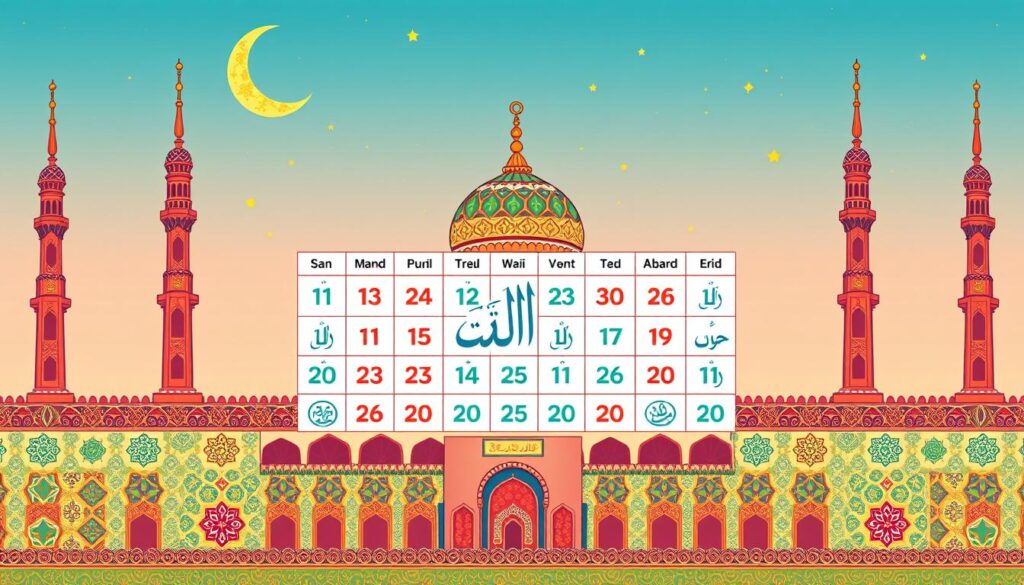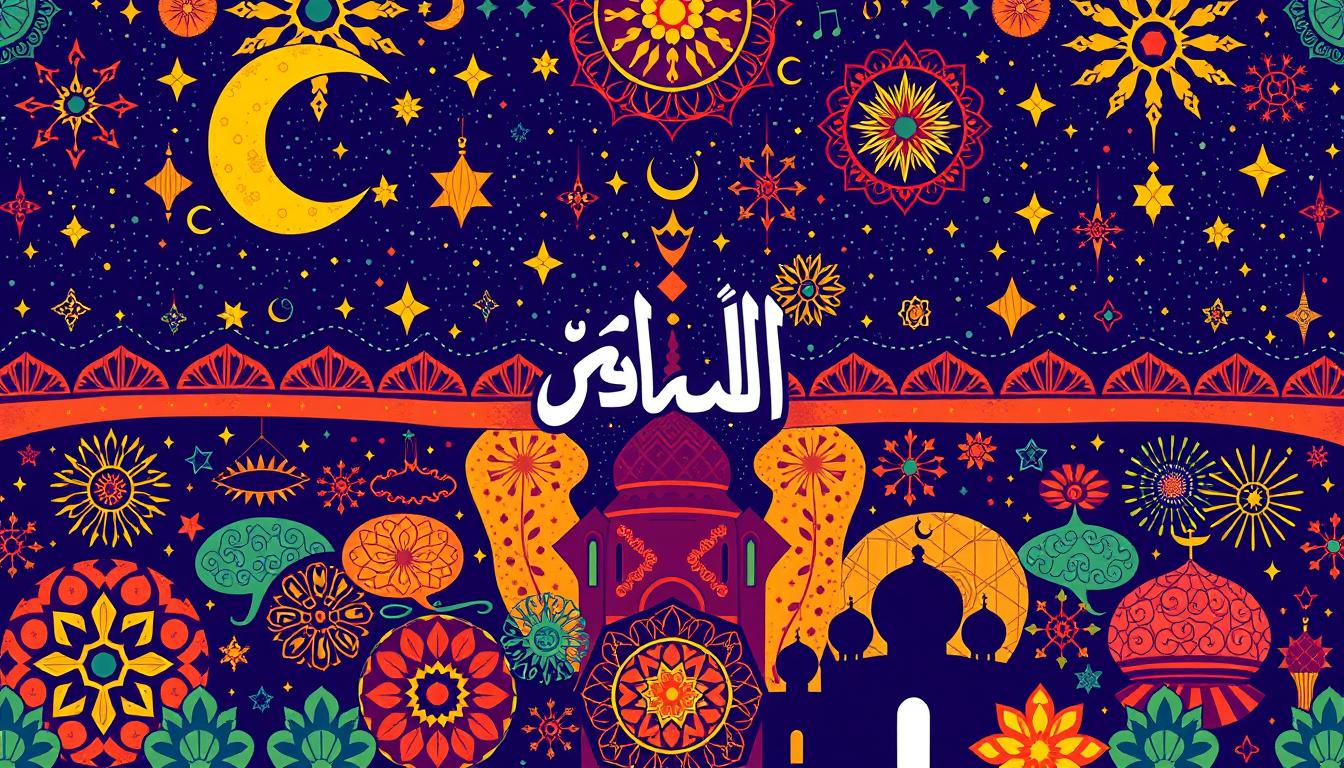Starting our journey with Islam means learning its common terms. These terms are crucial for building our Islamic vocabulary. They also help us feel closer to our faith and the Muslim community.
By knowing these important words, we can better enjoy our traditions, beliefs, and ways of life. It’s like seeing our faith in a brighter light.
This guide will show us important Muslim words that touch our everyday lives and spiritual journey. Knowing these terms strengthens us. It makes us more involved in helping others and taking part in community service.
Together, let’s start this journey of knowledge. Let’s understand how these Islamic terms play a big role in our lives.
Key Takeaways
- Familiarizing with Common Islamic Terminology enriches our understanding of the faith.
- Key Islamic terms provide a deeper connection with the Muslim community.
- Embracing Islamic vocabulary is essential for engaging in humanitarian efforts.
- Knowledge of Islamic glossary enhances appreciation of traditions and practices.
- This guide serves as a foundational step toward understanding Islamic concepts.
Introduction to Islamic Terminology
Getting to know Islamic terms is key for anyone wanting to get closer to the faith. It helps us talk well with others in our community, making our chats more lively. We dive into Islamic language to enjoy the depth of our culture and faith.
Importance of Understanding Islamic Terms
Knowing Islamic terms makes about 1.9 billion Muslims worldwide feel they belong. It gives us the means to understand the Qur’an and the Sunnah. This helps us have meaningful talks in different situations.
Islamic language brings together people from various cultures and places. It highlights what we all value and believe in.
Overview of Common Terms
There are several important Islamic terms:
- Salam: This greeting means “peace” and shows how important peace is when we meet others.
- Insha’Allah: Meaning “if God wills,” it shows we depend on Allah’s plans. About 70% of Muslims say this when making decisions.
- Alhamdulillah: Used to thank God, 60% of Muslims use this phrase every day.
- Assalam Alaikum: This common greeting means “peace be upon you”. It helps unite us and is used 80% of the time in our communities.
Learning these terms helps us practice our religion better and connect with others who believe the same.
The Qur’an: The Holy Book of Islam
The Qur’an is the main text of Islam, guiding and teaching its followers. It was given to the Prophet Muhammad over 23 years. With 114 chapters called surahs, they are grouped as Meccan or Medinan. This setup helps us deeply understand and feel connected to its teachings.
Structure of the Qur’an
The Qur’an has 114 surahs, adding up to about 6,348 verses or ayahs. The length of each surah varies. The shortest is Al-Kawthar with three verses, and the longest is Al-Baqara with 286 verses. These surahs are split into sections called juz’, making it easier to read, especially during Ramadan. This organization helps us think about and remember the Qur’an’s teachings better.
Key Themes in the Qur’an
Several key themes stand out in the Qur’an that speak to believers.
- Justice: It stresses being fair and just with everyone.
- Mercy: The importance of being kind and forgiving is a major theme.
- Guidance: It offers advice on how to live a good, ethical life.
- Inclusivity: The Qur’an connects with Christians and Jews, calling them “people of the book.”
Looking into these themes helps us apply the Qur’an’s lessons in daily life. This builds a strong community and a sense of duty, especially in helping others.

| Surah Name | Verse Count | Type |
|---|---|---|
| Al-Baqara | 286 | Medinan |
| Al-Kawthar | 3 | Meccan |
| Al-Fatiha | 7 | Meccan |
The Sunnah: The Way of the Prophet
The Sunnah is a key part of Islam, showing us how Prophet Muhammad (peace be upon him) lived. It teaches us to be kind, honest, and caring every day. By learning the Sunnah from Hadiths, we can improve how we act on our faith and morals.
Definition and Significance
“Sunnah” means a way to act, and it dates back before Islam. Today, it includes all of Prophet Muhammad’s practices. These teachings are a big part of Sharia law, guiding a Muslim’s ethical and spiritual life. The Qur’an tells us to follow the Prophet, showing the Sunnah’s importance in Islam.
Examples of Sunnah Practices
The Prophet’s teachings touch every part of our lives. By giving to the needy, helping our community, and treating people well, we live by these teachings. The Sunnah comes in three types:
- Sunnah Qawliyyah: The Prophet’s statements.
- Sunnah Fiiliyyah: His everyday actions.
- Sunnah Taqririyyah: When he approved of something someone else did.
By following the Sunnah, we build a kinder community. It helps us grow spiritually and make a positive impact around us.
| Sunnah Types | Description |
|---|---|
| Sunnah Qawliyyah | Specific sayings of Prophet Muhammad. |
| Sunnah Fiiliyyah | Actions frequently performed by the Prophet. |
| Sunnah Taqririyyah | Silent approvals of actions by others. |
Key Beliefs: Five Pillars of Islam
The Five Pillars of Islam are the core of our faith. They shape who we are as Muslims and guide what we do every day. Each pillar is a key part of Islamic life, connecting us to Allah and each other.
Shahada: The Declaration of Faith
The Shahada is a powerful statement of faith. It says we believe in Allah and Muhammad as His prophet. To become a Muslim, you say this in front of witnesses. It’s the first step in our faith journey and brings Muslims together.
Salah: The Prayer Ritual
Salah is praying five times a day. It keeps us close to Allah and makes us more mindful. On Fridays, we pray together, making our community stronger.
Zakat: The Almsgiving Obligation
Zakat asks us to give 2.5% of our wealth every year to help others. This supports needy Muslims and strengthens our communities. It makes our wealth purer and our bonds tighter.
Sawm: Fasting During Ramadan
Sawm means fasting from sunrise to sunset during Ramadan. It teaches us empathy and self-control. Even though some, like the sick or elderly, may not fast, it shows Islam’s kindness.
| Pillar | Description | Significance |
|---|---|---|
| Shahada | Declaration of faith in Allah and Muhammad | Foundation of Islamic belief |
| Salah | Five daily prayers connecting us with Allah | Cultivates mindfulness and discipline |
| Zakat | Annual almsgiving obligation | Supports those in need and purifies wealth |
| Sawm | Fasting during the month of Ramadan | Empowers self-discipline and community empathy |
Understanding Islamic Law: Sharia
Sharia is key in Islamic law, guiding Muslims in many areas of life. It builds on teachings from the Qur’an and the Sunnah, covering both religious and everyday practices. Understanding Sharia helps us follow societal norms while keeping our faith strong. This part talks about Sharia’s basics, its sources, and clears up some wrong ideas about it.
What is Sharia?
Sharia guides Muslims on how to behave ethically and morally. It started after the Prophet Muhammad ﷺ passed away. Sharia is based on the Qur’an, Sunnah, scholarly agreement (ijmāʿ), and reasoning (qiyās). This mix leads to many interpretations, offering up to ten different views on legal questions.
The Sources of Sharia
The main sources of Sharia are:
- The Qur’an: Islam’s holy book, with divine instructions.
- The Sunnah: Practices of the Prophet Muhammad ﷺ, explaining Qur’anic texts.
- Ijma: Scholars’ consensus, shaping legal decisions.
- Ijtihad: Scholarly interpretation, adding flexibility and context.
These parts form and interpret Sharia, covering areas like marriage rights, crime punishments, and business deals.
Misconceptions About Sharia
Some misunderstandings paint Sharia in a harsh light, forgetting its real goals of justice, equality, and kindness. Though some countries enforce strict rules that can be severe, Sharia focuses on protecting people’s rights. Misconceptions often overlook how local traditions influence Sharia’s application. Common misunderstandings about Sharia are addressed here.
Countries like Iran, Mauritania, and Saudi Arabia may have laws tied to Sharia, but these might not fully match its principles. Sharia’s interpretation can vary with the societal context. By correcting these wrong ideas, we aim for a deeper grasp of Islamic law. This encourages fairness and a society that treats everyone well.
Concepts of Time in Islam
Understanding the Islamic calendar opens a window to Muslim traditions. It differs from the Gregorian calendar, using lunar months instead of solar. This calendar consists of 12 months, each being 29 or 30 days long. So, the year totals about 354 days. By learning about the Islamic calendar, we grasp the significance of Islamic events and traditions.
Islamic Calendar: Lunar vs. Gregorian
The Islamic calendar is crucial for setting important religious dates. Here’s how the lunar and Gregorian calendars compare:
| Feature | Islamic Lunar Calendar | Gregorian Solar Calendar |
|---|---|---|
| Basis | Lunar months (29 or 30 days) | Solar months (30 or 31 days) |
| Year Length | Approximately 354 days | Approximately 365 days |
| Significant Dates | Dependent on moon sighting | Fixed dates |
| Examples of Observance | Ramadan, Eid al-Fitr, Hajj | New Year, Christmas, Independence Day |
Significant Dates in Islam
The lunar calendar tells us about Islamic months and special dates. Ramadan is the ninth month and a time for fasting and thinking deeply. Muslims don’t eat or drink from dawn to sunset. In 2024, Ramadan starts on March 11, but the exact date may change with the moon. Eid al-Fitr is on April 9, celebrating the end of Ramadan with joy.

Tarawih prayers happen in the evenings of Ramadan. The last ten nights are especially important, motivating Muslims to pray more and do good deeds.
As significant dates approach, let’s think about community and personal growth. The Islamic calendar reminds us about unity and doing good. It inspires us to help others through charity work at Umar Khan Charity.
The Role of the Mosque
A mosque is crucial for Muslims, serving as a spiritual and community center. It promotes unity, group worship, and social activities. Knowing the role of the mosque helps us connect better within our communities and with our faith.
What is a Mosque?
The word “mosque,” or masjid in Arabic, means “a place of prostration.” It is where Muslims meet for prayers (ṣalāt) and other community events. More than a building, the mosque represents Islam’s spiritual heart. It’s a place for learning, social justice, and historical political action, including fighting against oppression.
Key Features of a Mosque
Featuring architectural components that enhance worship, mosques include:
- Prayer Hall: A large open area for congregational prayers where worshippers are arranged in neat rows.
- Minaret: A tall tower from which the call to prayer (adhān) is proclaimed five times a day by the muezzin.
- Mihrab: A semicircular niche that indicates the qiblah, the direction Muslims face during prayer.
- Minbar: A pulpit where the preacher delivers sermons, typically located to the right of the mihrab.
- Maqsūrah: A partition historically used to protect rulers during prayer.
These elements work together to foster spiritual growth and community unity. Mosques also provide spaces for women and offer prayer mats. Education is key, with many mosques having schools for teaching the Qurʾān and Islamic values.
In many ways, mosques play a similar role to organizations like Umar Khan Charity, encouraging collective effort and community betterment. Understanding the mosque’s features deepens our appreciation of its influence on our spiritual lives.
Islamic Theology: Understanding Allah
Understanding Allah is essential for our faith. At Islamic belief’s core is Tawhid, highlighting Allah’s oneness. It shows His distinct nature, unlike any other divine depiction of being shared or multiple. In this part, we’ll learn about Allah’s names and attributes. This knowledge gives us inspiration and strength every day.
The Concept of Tawhid
Tawhid is about Allah being singular and unique. It comes from an Arabic word meaning “one.” This idea strengthens our grasp of divine unity. It tells us that Allah is the only one deserving our worship. The phrase “There is no god but Allah and Muhammad is his messenger” is our faith’s core. It shows our loyalty to the only true God and our dedication to His teachings.
Names and Attributes of Allah
The Qur’an lists 99 names for Allah, called “al-asmāʾ al-ḥusnā.” Each name reveals different aspects of Allah, showing his qualities. These help us connect more deeply with Him. His attributes include:
| Attribute | Arabic Name | Meaning |
|---|---|---|
| The Living One | الْحَيُّ الْقَيُّومُ (al-Ḥayy al-Qayyūm) | Ever-living, Sustainer of all |
| The Real Truth | الْحَقُّ (al-Ḥaqq) | Ultimate reality and truth |
| The Wise | الْحَكِيمُ (al-Ḥakīm) | Possessor of infinite wisdom |
| The Compassionate | الرَّحْمَنُ (al-Raḥmān) | Benevolent and compassionate |
| The Merciful | الرَّحِيمُ (al-Raḥīm) | Continuous mercy and kindness |
Thinking about Allah’s attributes helps our spiritual growth. It motivates us to show these traits in our work to help others. By knowing Allah’s names, we remember our duty to all creation. We aim to reflect His mercy and wisdom in what we do.

Community in Islam: Ummah
The concept of Ummah shows how Muslims worldwide are closely linked. It reminds us to support each other and help those in need globally. Understanding Ummah helps us see our role in the Islamic community better.
Definition of Ummah
The word Ummah appears 62 times in the Qur’an. It first included all who believe in one God but now refers to Muslims. The term “Ummah Wāhidah” means One Nation, stressing unity among Muslims everywhere. It teaches that all Muslims, no matter where they are, are part of a big, worldwide family.
Importance of Community in Islam
The Ummah teaches us about the ethical and spiritual sides of Islam. The Qur’an calls the Muslim Ummah the best community for fostering unity above personal differences. Prophet Muhammad said Muslims are like one body, sharing each other’s joy and pain.
This strong unity and willingness to help each other are key for building a strong society. Being part of the Ummah means being active in our communities, locally and worldwide. Together, we can make a difference, promoting Islamic values of kindness, justice, and equality for everyone.
Conclusion: Embracing Islamic Terminology
As we wrap up our look at Common Islamic Terminology, let’s remember the value of continuing to learn together. Understanding Islamic terms helps our faith grow and shows us how to serve our communities better. With so many Muslims around the world, standing together in knowledge is more important than ever.
Continuing Your Learning Journey
We encourage everyone to keep learning about Islam through trusted sources. You can use online sites, books, or local groups to learn more about the Qur’an, Sunnah, and Sharia. Sharing what we learn helps us all stand together, ready to make a difference.
Resources for Further Study
There are many ways to dive deeper into Islamic terminology and teachings. Community centers offer classes, and many trusted groups have online courses and books. Getting into these resources helps us grow and work together on big projects, like those by charities around the world. With our knowledge and kindness, we can really help our communities.






